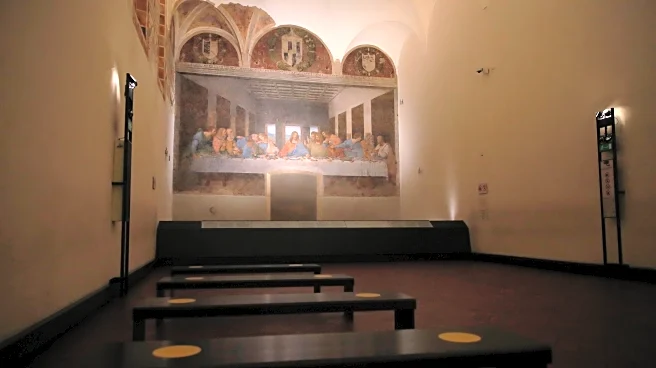What is the story about?
What's Happening?
Pope Leo XIV has issued his first major teaching, titled 'I Have Loved You,' which focuses on the importance of caring for the poor. This document serves as a continuation of Pope Francis' last major teaching, which Leo completed after Francis' death. In his message, Pope Leo emphasizes the Church's role in opposing slavery, human trafficking, forced labor, and sexual exploitation, while also advocating for the support of migrants and refugees. He has urged U.S. bishops to support migrants amidst the Trump administration's intensified deportation efforts. Cardinal Michael Czerny clarified that the teachings are universally applicable, not specifically targeting the United States.
Why It's Important?
Pope Leo's teaching underscores the Catholic Church's ongoing commitment to social justice issues, particularly poverty and migration. By aligning with Pope Francis' previous teachings, Leo reinforces the Church's stance on these global challenges. His call for U.S. bishops to support migrants highlights the Church's opposition to restrictive immigration policies, potentially influencing public opinion and policy discussions. This teaching may strengthen the Church's advocacy for marginalized groups, impacting societal attitudes and government actions worldwide.
What's Next?
The release of Pope Leo's teaching may prompt discussions among U.S. bishops and Catholic communities regarding their role in supporting migrants and addressing poverty. As the Trump administration continues its deportation campaign, the Church's stance could lead to increased advocacy efforts and potential policy shifts. Additionally, Pope Leo's emphasis on continuity with Pope Francis' teachings suggests further initiatives focused on environmental issues and social justice, potentially influencing global Catholic priorities.
Beyond the Headlines
Pope Leo's teaching may have deeper implications for the Catholic Church's approach to modern social issues. By addressing poverty and migration, Leo highlights ethical considerations and the Church's moral responsibility to advocate for vulnerable populations. This focus may encourage broader discussions on the Church's role in contemporary society, potentially leading to long-term shifts in its priorities and influence on global social justice movements.

















